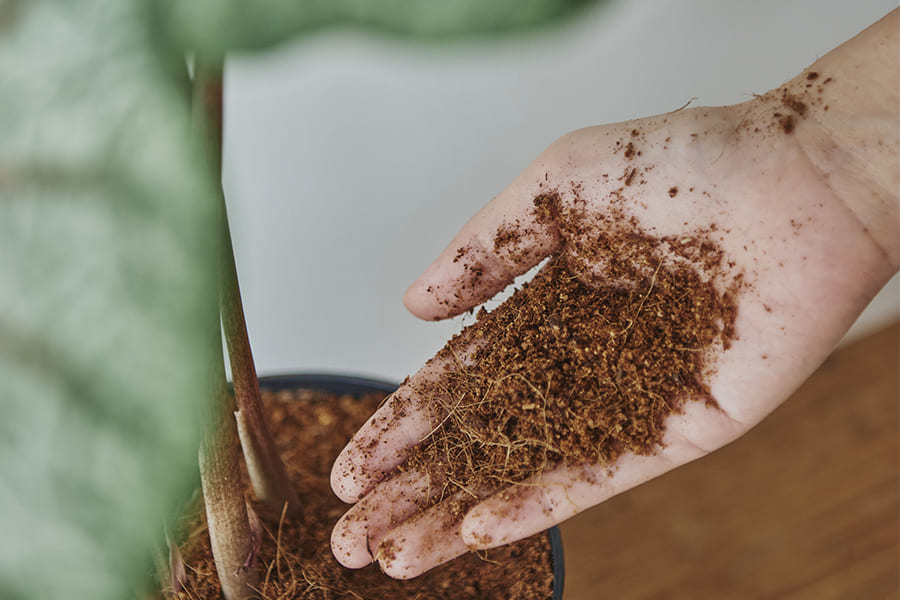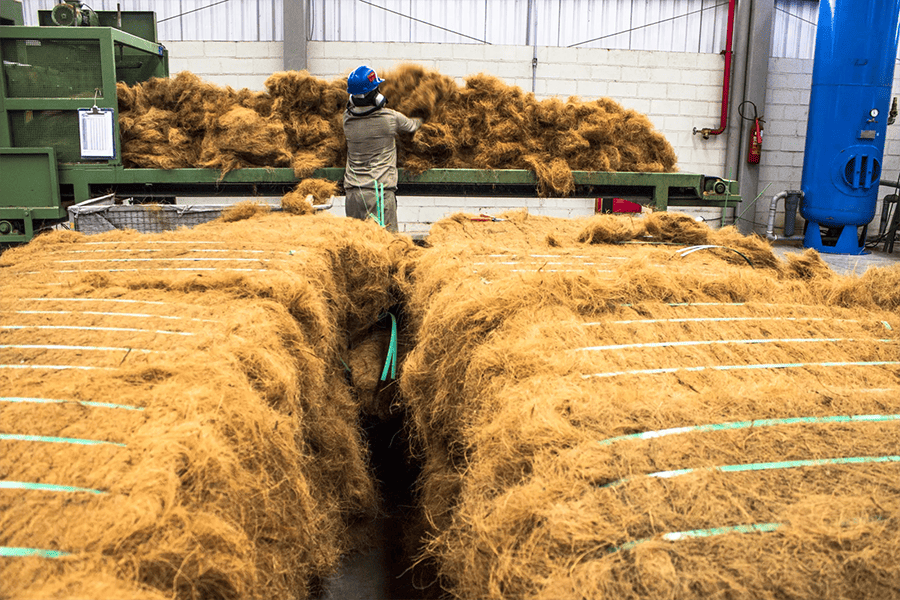BLOG POSTS & ARTICLES
Coco Coir: An Anti-Fungal and Mold-Resistant Growing Medium for Your Garden

Home gardening can be a fulfilling and rewarding hobby, but it comes with its challenges, and one common problem gardeners face is mold growth. Mold can thrive in damp and humid conditions, often appearing on the soil surface, plant leaves, or even in pots and containers. Excessive watering, poor drainage, and lack of proper airflow can contribute to mold issues in the garden. To combat this problem, using a suitable growing medium such as coco coir can be beneficial. Coco coir offers excellent drainage, aeration, and natural antifungal properties, reducing the risk of mold formation.
The popularity of COCO coir:
Coco coir is a natural and renewable byproduct derived from coconut husks. This versatile and eco-friendly material has been gaining significant traction in the gardening and agriculture industries over the past decade. Initially used primarily as a hydroponic growing medium, coco coir's exceptional properties have led to its widespread adoption in various applications, including soil amendment, potting mix, and more. The rising popularity of coco coir can be attributed to several factors:
Environmental Consciousness:
As people become more environmentally aware, the demand for sustainable and eco-friendly gardening and agricultural products has grown. Coco coir's use of a renewable byproduct and reduction of waste aligns with these values, making it an attractive choice for environmentally conscious consumers.
Performance and Versatility:
Coco coir's unique properties, such as excellent water retention and aeration, make it highly effective for various growing methods. Its ability to strike a balance between providing moisture and preventing water logging appeals to both novice and experienced gardeners.
Organic Gardening:
With the increasing interest in organic gardening and farming, coco coir fits the bill as a natural and chemical-free growing medium. Its lack of harmful chemicals, pathogens, and seeds makes it a safe choice for those seeking to grow produce without synthetic additives.
Easy to Use:
Coco coir is user-friendly and requires minimal preparation before use. It comes in various forms, such as blocks, bricks, and loose fibers, making it easy to handle, transport, and store.
Adoption by Gardening Enthusiasts:
As more gardening enthusiasts and hobbyists share their positive experiences with coco coir, it has gained momentum through word-of-mouth and online gardening communities.
Low EC Levels:
Unlike traditional soil amendments, coco coir has low electrical conductivity (EC) levels. This means it holds fewer salts, reducing the risk of nutrient toxicity and making it suitable for sensitive plants.
Anti-fungal properties of Coco coir:
COCO coir's natural antifungal properties can be attributed to several factors:
Lignin content:
Coco coir contains a high amount of lignin, which is a complex organic polymer that provides structural support to the cell walls of plants. Lignin is resistant to microbial degradation, including fungal attacks, making coco coir less susceptible to fungal growth.
Low nutrient content:
Coco coir has a low nutrient content compared to other organic substrates like peat moss. While this may not directly contribute to its antifungal properties, it helps create an environment less favorable for fungal growth. Fungi generally thrive in nutrient-rich environments, and coco coir's low nutrient content can discourage their proliferation.
pH levels:
Coco coir usually has a slightly acidic pH, typically around 5.5 to 6.5. This acidic environment can inhibit the growth of certain fungal species that prefer more alkaline conditions.
Antimicrobial compounds:
Coconut coir contains natural compounds that possess antimicrobial properties. Some of these compounds may have antifungal effects, helping to inhibit fungal growth in the coir.
Physical structure:
Coco coir has a fibrous and airy texture, which promotes good aeration and drainage. The well-aerated and well-draining nature of coco coir helps to prevent waterlogged conditions that can encourage fungal growth.
Heat treatment:
Some commercial coco coir products undergo heat treatment or pasteurization processes to remove potential pathogens, including fungi. This treatment further enhances coco coir's antifungal properties.
Advantages of Anti-fungal properties:
There are a few studies that have been conducted to investigate the mold-resistant properties of coco coir. One study, published in the journal Horticultural Science, found that coco coir was effective in suppressing the growth of mold and fungus in potting mixes. Another study, published in the journal Plant Growth Regulation, found that coco coir could be used to control the growth of mold and fungus on plant roots.
Disease Resistance: The high lignin content and presence of tannins in coco coir create a barrier against fungal invasion, effectively preventing soil-borne pathogens from colonizing the root zone and causing diseases like root rot and damping-off. This resistance significantly reduces the risk of infections and contributes to overall plant health.
Improved Plant Growth: By mitigating fungal threats, coco coir allows plants to focus their energy on healthy growth and development. The fibrous structure of coco coir ensures excellent aeration and drainage, providing a balanced environment with steady moisture and oxygen supply to the roots, thereby supporting optimal growth.
Enhanced Root Zone Health: Coco coir's ability to deter fungal growth in the root zone protects the root system from damage and stress. Healthy roots are better equipped to absorb essential nutrients and water, leading to the development of stronger, more resilient plants.
5 Best practices to follow for maximum effect:
- Proper drainage: Ensure that your coco coir medium has excellent drainage.
- Avoid overwatering: Water your plants only when necessary and avoid letting water accumulate in saucers or trays.
- Good aeration: Fluff the coir regularly to maintain proper aeration.
- Sterilization: If you are using coco coir for seedlings or young plants, consider sterilizing the medium before use.
- Maintaining Humidity: High humidity can contribute to fungal growth. Therefore it is important to regularly maintain humidity with a hygrometer.
- Inspect plants regularly: Keep an eye on your plants for any signs of fungal infections, early detection can prevent the spread of the fungus to other plants.












__(3).jpg)








